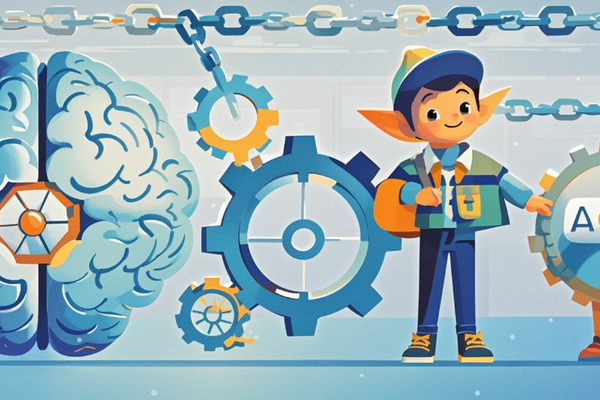AI Agent:机遇与挑战并存
AI Agent,一种能够自主感知环境、做出决策并执行行动的智能体,被认为是未来 AI 的重要发展方向。然而,AI Agent 的发展之路并非一帆风顺, recent events surrounding OpenAI’s “Agent Bible” and LangChain creator Harrison Chase’s criticism have sparked a heated debate about the future of AI Agent. Let’s delve into the details and explore the opportunities and challenges that lie ahead.
The “Bible” that missed the mark
OpenAI, a leading player in the AI industry, recently released a comprehensive guide aimed at helping developers build intelligent agents. However, this much-anticipated “Agent Bible” has faced harsh criticism, with LangChain creator Harrison Chase describing it as “full of holes.” So, what went wrong with this supposedly definitive guide?
Chase’s criticism centers around several key issues:
- Theory vs. practice: The guide may contain overly idealistic assumptions and designs that fail to consider real-world application scenarios. In practical environments, agents must navigate complex and dynamic situations, which the guide may not have adequately addressed.
- Lack of practicality: The guide might contain vague descriptions and lack specific implementation steps and code examples, making it difficult for developers to apply in real-world projects.
- Ignoring existing tools and technologies: The guide may not fully leverage existing tools and technologies, instead attempting to build a new solution from scratch, which could lead to reinventing the wheel and increased development costs.
- Neglecting safety and reliability: The guide may not have sufficiently addressed the safety and reliability issues of agents. Agents can make mistakes or be exploited maliciously, potentially leading to severe consequences.
As the creator of LangChain, a popular open-source framework for simplifying AI Agent development, Chase’s critique is well-informed and based on his deep understanding of the industry.
Opportunities and challenges in AI Agent development
Despite the setback with OpenAI’s guide, the future of AI Agent remains promising. Here are some opportunities and challenges in AI Agent development:
Opportunities:
- Automation and efficiency: Agents can autonomously perform various tasks, leading to automation and efficiency gains. For example, agents can handle customer service requests, monitor production lines, or execute financial transactions.
- Personalized services: Agents can provide personalized services based on user preferences and history. For instance, agents can recommend products based on purchase history or provide health advice based on health data.
- Innovative applications: The emergence of agents will drive the creation of new applications, such as autonomous vehicles, smart homes, and virtual assistants.
Challenges:
- Technical complexity: Building powerful agents requires expertise in multiple AI technologies, such as natural language processing, machine learning, and reinforcement learning.
- Data requirements: Agents need large amounts of data for training to achieve good performance.
- Safety and reliability: Ensuring the safety and reliability of agents is a significant challenge.
- Ethical concerns: The use of agents may raise ethical issues, such as privacy protection and algorithmic bias.
Building more reliable AI Agents
To overcome these challenges and seize the opportunities, consider the following suggestions for building more reliable AI Agents:
- Pragmatic approach: Instead of striving for perfection, start with small-scale projects and iterate gradually.
- Embrace existing tools: Leverage existing tools and technologies, such as LangChain, to avoid reinventing the wheel.
- Focus on safety and reliability: Address safety and reliability concerns throughout the agent’s design and development process.
- Continuous learning and exploration: The AI Agent field is evolving rapidly, so developers must keep learning and exploring to stay ahead.
- Address ethical issues: Be mindful of ethical concerns throughout the agent’s use and development.
The future of AI Agents: Where are they headed?
Despite the challenges, the future of AI Agents is bright. As technology advances and applications expand, agents will play an increasingly important role in various industries.
We can envision a future where AI Agents are more intelligent, reliable, and secure. They will better understand human intent, adapt to complex environments, and serve human society more effectively.
Chase’s critique serves as a wake-up call, encouraging the industry to approach AI Agent development more realistically and sustainably. By addressing the current issues and learning from past mistakes, we can pave the way for a more promising future for AI Agents.
From “flop” to reflection: Redefining the path for AI Agent development
The “flop” of OpenAI’s “Agent Bible” is not a rejection of OpenAI but an invitation for the industry to reflect on the current state of AI Agent development. Chase’s criticism is not an attempt to discredit OpenAI but a call for increased awareness and attention to the existing challenges.
This event offers several insights:
- Critical thinking: Don’t blindly follow authority; maintain a critical mindset and question and validate any theory or technology.
- Value practical experience: While theoretical research is essential, prioritize practical experience and combine theory with practice to solve real-world problems.
- Open collaboration: AI Agent development requires open collaboration and collective wisdom to drive technological progress.
- Focus on social value: AI Agent development should ultimately serve human society, so consider its social value and ensure it aligns with human interests.
The future of AI Agents is filled with opportunities, but also presents significant challenges. By acknowledging these issues, learning from past mistakes, and continuously innovating, we can grasp the opportunities, overcome the challenges, and ultimately realize the vision of AI Agents.

